Boris Johnson timeline: Extraordinary career of Britain’s former prime minister as he quits as MP
A lively journey from Fleet Street to Partygate by way of Have I Got News For You, the Olympics and Brexit
He was the London mayor who basked in the glory of the 2012 Olympics, before leading the Conservatives to a landmark election victory on the back of his promise to “get Brexit done”.
But Boris Johnson’s career will perhaps best be remembered for being peppered with scandal - primarily the lockdown-busting parties which cast a shadow over his political future.
It’s perhaps, then, no surprise that it was the Partygate scandal which ultimately led to him announcing he would quit as MP, as he accused the Commons investigation looking into whether he misled Parliament over the issue of attempting to “drive me out”.
The former prime minister was forced out of Downing Street by a landslide of Conservative resignations in summer 2022, but he had been dogged for months by allegations about a string of rule-breaking social events that took place at the height of the coronavirus pandemic.
He had emphatically assured the Commons that the official guidance had been observed at all times, only for investigations by senior civil servant Sue Gray and the Metropolitan Police to conclude otherwise.
The ex-PM later gave evidence, saying he would never have dreamed of intentionally lying about his conduct.
But, as his critics and allies alike waited for the outcome of that investigation, he announced he would quit as MP for Uxbridge and South Ruislip, accusing the committee of producing a yet-to-be-published report “riddled with inaccuracies and reeks of prejudice”.
He said he thought their “purpose from the beginning has been to find me guilty, regardless of the facts”.
He went on to say it was “sad” to be leaving Parliament, but also hinted that he could consider a potential return.
Here’s a look back at the undeniably extraordinary career of Alexander Boris de Pfeffel Johnson.
19 June 1964: Born in New York City, the son of Stanley Johnson and Charlotte Fawcett. He is educated at the prestigious Eton College and Balliol College, Oxford, where he studies classics, gains popularity (or notoriety) as a member of the Bullingdon Club and serves as both secretary and then president of the Oxford Union. He then commences a career in journalism, first with The Times and Telegraph before being appointed editor of The Spectator in 1999. As a columnist, he attracts attention for his fruity, flippant and frequently offensive turns of phrase, which he capitalises on through a string of appearances on the BBC’s satrical quiz show Have I Got News For You, beginning in April 1998. He marries Allegra Mostyn-Owen in 1987 before divorcing her and marrying Marina Wheeler in 1993.
2001-2008: Commences his political career in earnest when he is elected as MP for the constituency of Henley in Oxfordshire.
2008-2016: Serves as mayor of London, overseeing the “Boris Bike” scheme and the 2012 London Olympic Games. He is elected as MP for Uxbridge and South Ruislip in the May 2015 general election, paving the way for his eventual return to the Commons.
2016: Becomes co-leader of the Leave campaign lobbying to take Britain out of the European Union (EU), putting him at odds with then-prime minister and fellow Bullingdonian David Cameron. When the British public votes for Brexit by a narrow margin on 23 June 2016, Mr Cameron resigns.
2016-2018: Serves as foreign secretary under Mr Cameron’s successor, Theresa May. Careless comments he makes in November 2017 about British national Nazanin Zaghari-Ratcliffe, imprisoned on spurious charges in Iran, thwart her immediate hopes of release and bring a storm of condemnation for which he only belatedly apologises. Mr Johnson resigns in July 2018 in opposition to Ms May’s strategy for a “soft” Brexit that would maintain close ties with the EU.
8 April 2019: Accused by the Commons Standards Committee of displaying “an over-casual attitude towards obeying the rules of the House” by failing to declare a financial interest in a property within the appropriate time frame, a verdict coming just four months after he was made to apologise for breaching the rules by failing to declare more than £52,000 of outside earnings.
7 June 2019: Ms May resigns as Conservative leader over her failure to persuade Parliament to back the Brexit agreement she had negotiated with the EU. The party is split between those who back her and hard-liners, led by Mr Johnson, who are willing to risk a no-deal Brexit in order to wring concessions from the EU.
23 July 2019: Mr Johnson is elected Tory leader in a vote by party members. He takes office as PM the next day, inheriting a minority government that relies on votes from Northern Ireland’s Democratic Unionist Party to pass legislation. Mr Johnson insists Britain will leave the EU on 31 October, with or without a deal.
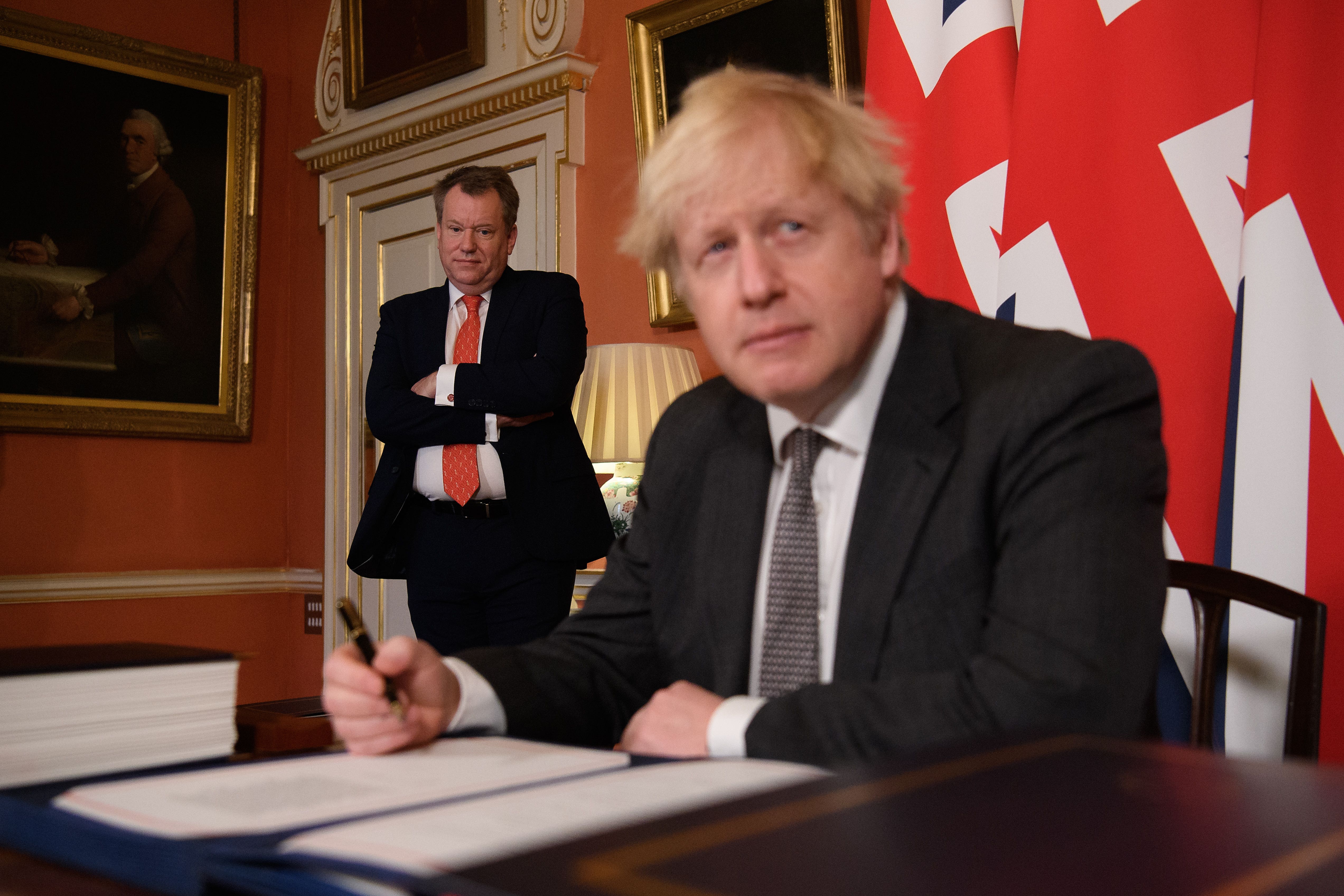
28 August 2019: Mr Johnson announces he will shut down Parliament until mid-October, giving opponents less time to thwart a no-deal Brexit.
3 September 2019: Twenty-one rebel Conservative MPs support legislation requiring the government to seek an extension to Brexit negotiations if it can’t negotiate an agreement with the EU. The measure passes and the rebels are expelled from the party.
5 September 2019: Mr Johnson asserts he would rather be “dead in a ditch” than ask the EU for another extension.
24 September 2019: The UK’s Supreme Court rules that the government’s proroguing of Parliament was unlawful.
19 October 2019: Mr Johnson does ask the EU to delay Brexit again. A new deadline is set for 31 January 2020.
6 November 2019: Parliament is dissolved and early elections are set for mid-December as Mr Johnson pursues a mandate for his Brexit strategy.
12 December 2019: Mr Johnson wins an 80-seat majority in the general election, giving him the backing to push through his Brexit legislation. The scale of the victory over Jeremy Corbyn’s Labour makes him the most electorally successful Conservative leader since Margaret Thatcher.
23 January 2020: The Brexit deal becomes law after approval by the UK Parliament. The European Parliament approves the deal six days later.
23 March 2020: Mr Johnson places Britain in lockdown in response to the Covid-19 global pandemic, having initially been keen to dismiss the threat posed by the virus.
5 April 2020: Mr Johnson is hospitalised and later moved to intensive care after contracting the coronavirus. He is released from hospital on 12 April, thanking the nurses who sat with him through the night to make sure he kept breathing.
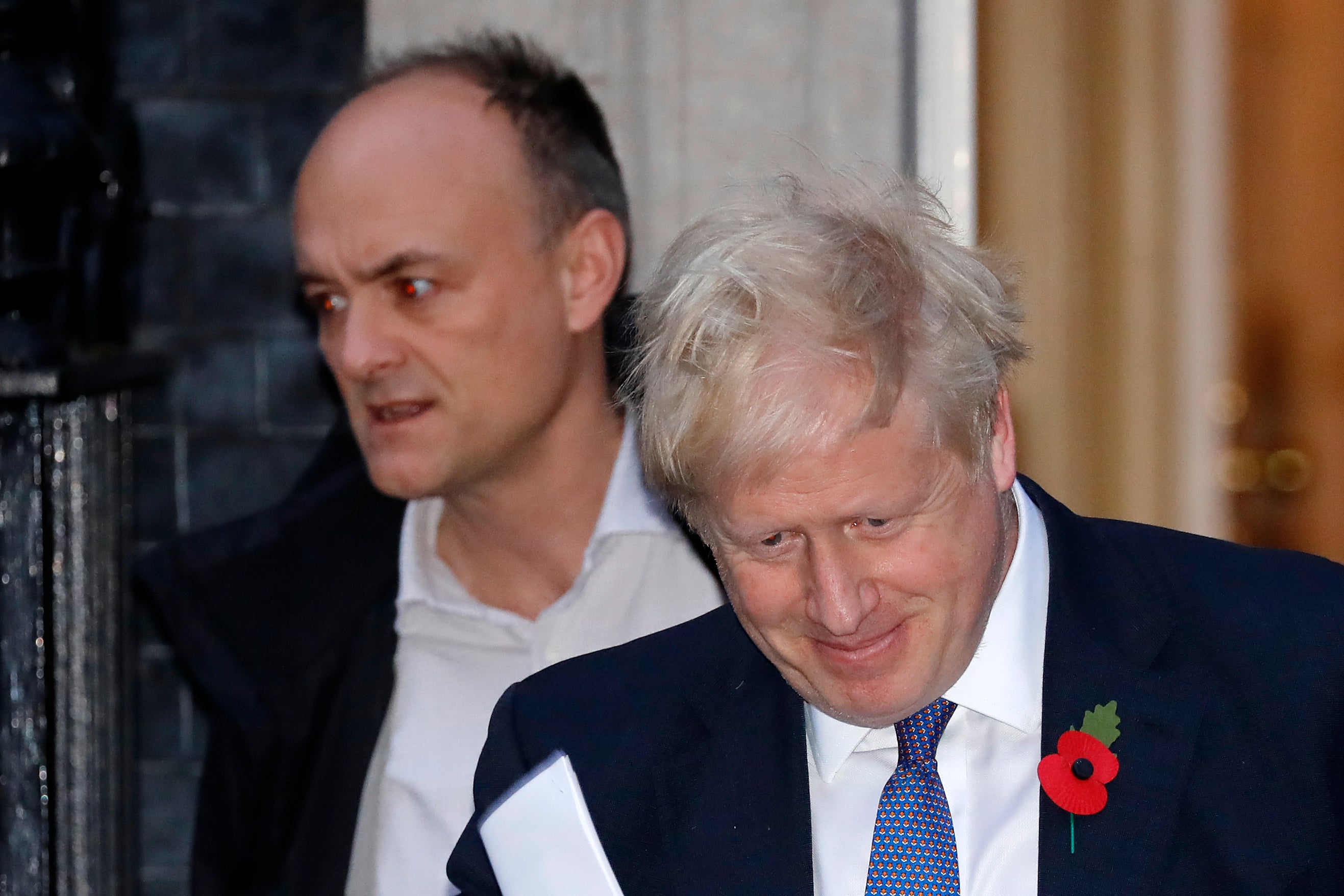
3-4 November 2021: Mr Johnson’s government orders Conservative MPs to support a change in ethics rules to delay the suspension of Owen Paterson, a supporter of the PM who had been censured for breaching lobbying rules. The measure passes. A day later, facing an angry backlash from all sides, Mr Johnson changes course and allows MPs to vote on Mr Paterson’s suspension. Mr Paterson resigns.
30 November 2021: Allegations first surface that government officials attended parties in government offices during November and December 2020 in violation of Covid lockdown rules imposed by Mr Johnson’s own administration. The scandal grows as more and more parties are reported by the press. Mr Johnson denies the allegations but opposition leaders criticise the government for breaking the law while people across the country made sacrifices to combat the pandemic, staying indoors, not seeing loved ones in person for months on end and even missing funerals in order to adhere to the rules.
8 December 2021: Mr Johnson authorises an investigation into the scandal, now dubbed “Partygate”, to be overseen by veteran civil servant Sue Gray. Pressure builds for a leadership challenge, with popular chancellor Rishi Sunak rumoured to be plotting a bid, but gradually fizzles out.
3 February 2022: Mr Johnson’s long-time aide, Munira Mirza, quits Downing Street, followed by three other top aides in protest against a smear the PM had made against Labour leader Sir Keir Starmer.
24 February 2022: Mr Johnson repeals the last of the Covid restrictions placed on the British public after the success of the vaccine rollout enables the country to see off the threat posed by the Omicron variant over the winter season. On the same day, Russia invades neighbouring Ukraine, commencing a whole new international political crisis.
9 April 2022: Mr Johnson meets Ukrainian president Volodymyr Zelensky in Kyiv in a show of solidarity following Russia’s invasion, pledging a new package of military and economic support. The move helps bolster Mr Johnson and his supporters, who argue the government should focus on the war rather than domestic political strife.
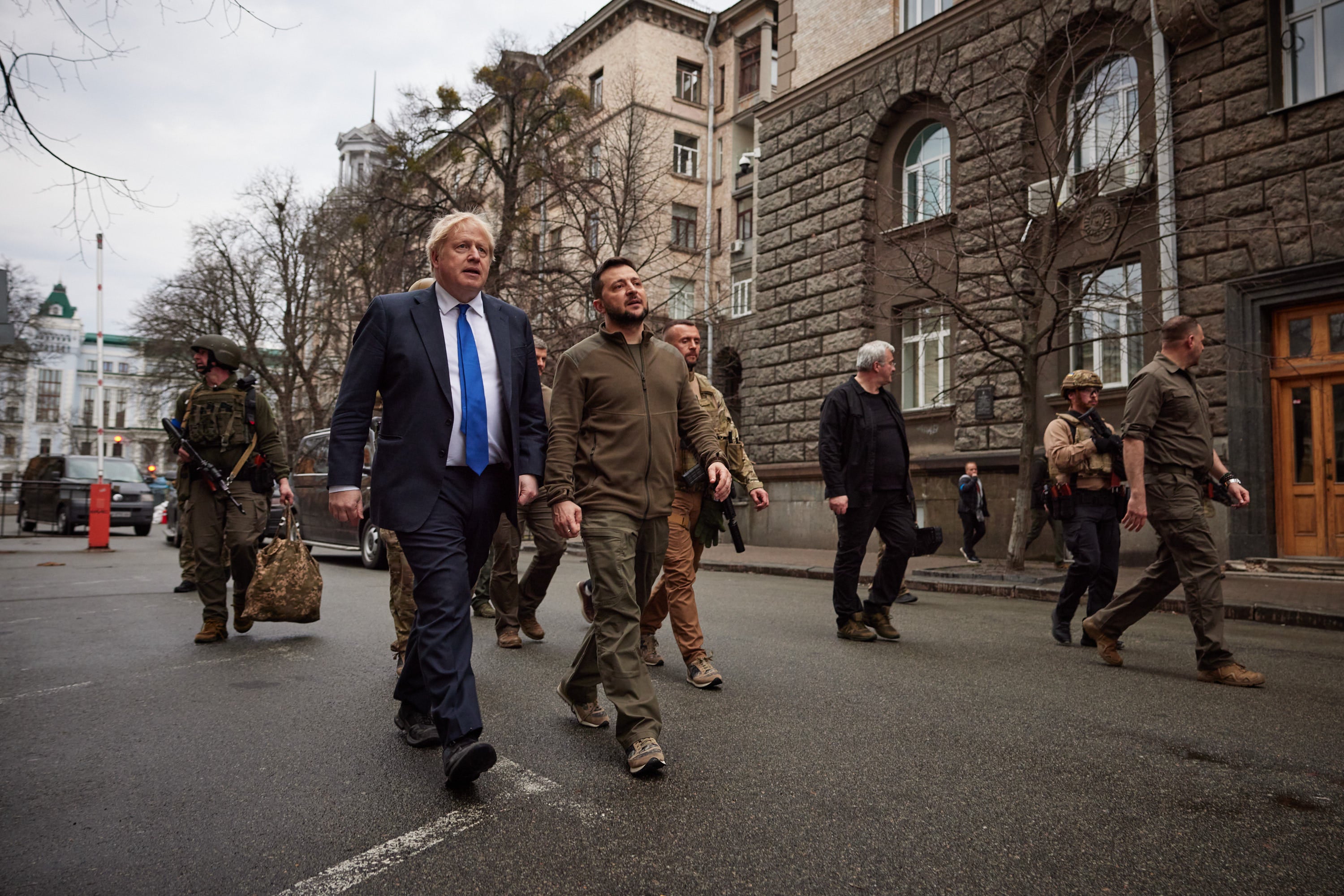
12 April 2022: Mr Johnson is fined £50 by the Metropolitan Police for attending one of the lockdown parties. Opposition parties characterise him as the first PM in history shown to have broken the law while in office. He apologises but insists he did not know he was breaking the rules.
22 May 2022: Findings from Ms Gray’s Partygate investigation are published, detailing 16 gatherings at Mr Johnson’s home and office and other government offices between May 2020 and April 2021. The report recounts tales of excessive drinking among some of Mr Johnson’s staff at a time when millions of people were unable to see friends and family because of the virus.
6 June 2022: Mr Johnson narrowly wins a vote of no confidence, with Conservative MPs voting 211 to 148 to back him. But the scale of the revolt – some 41 per cent voted against him – shakes his grip on power.
15 June 2022: Lord Geidt quits as ethics adviser to Mr Johnson, accusing the Conservative government of planning to flout conduct rules.
24 June 2022: Mr Johnson’s Conservatives lose two former strongholds to opposition parties in special elections held in Wakefield and Tiverton and Honiton.
29 June 2022: Parliament’s cross-party Privileges Committee issues a call for evidence for a probe into whether Mr Johnson intentionally misled Parliament with his statements regarding the lockdown parties.
30 June 2022: Chris Pincher resigns as Conservative deputy chief whip amid allegations that he assaulted two guests at a private members’ club in London. Previous sexual misconduct allegations emerge about Pincher. Questions swirl over whether Mr Johnson knew about the claims when Pincher was given the job.
5 July 2022: Mr Johnson apologises for his handling of the Pincher affair and says he had forgotten about being told of the allegations. Two of his most senior Cabinet ministers, Mr Sunak and health secretary Sajid Javid, quit the government.
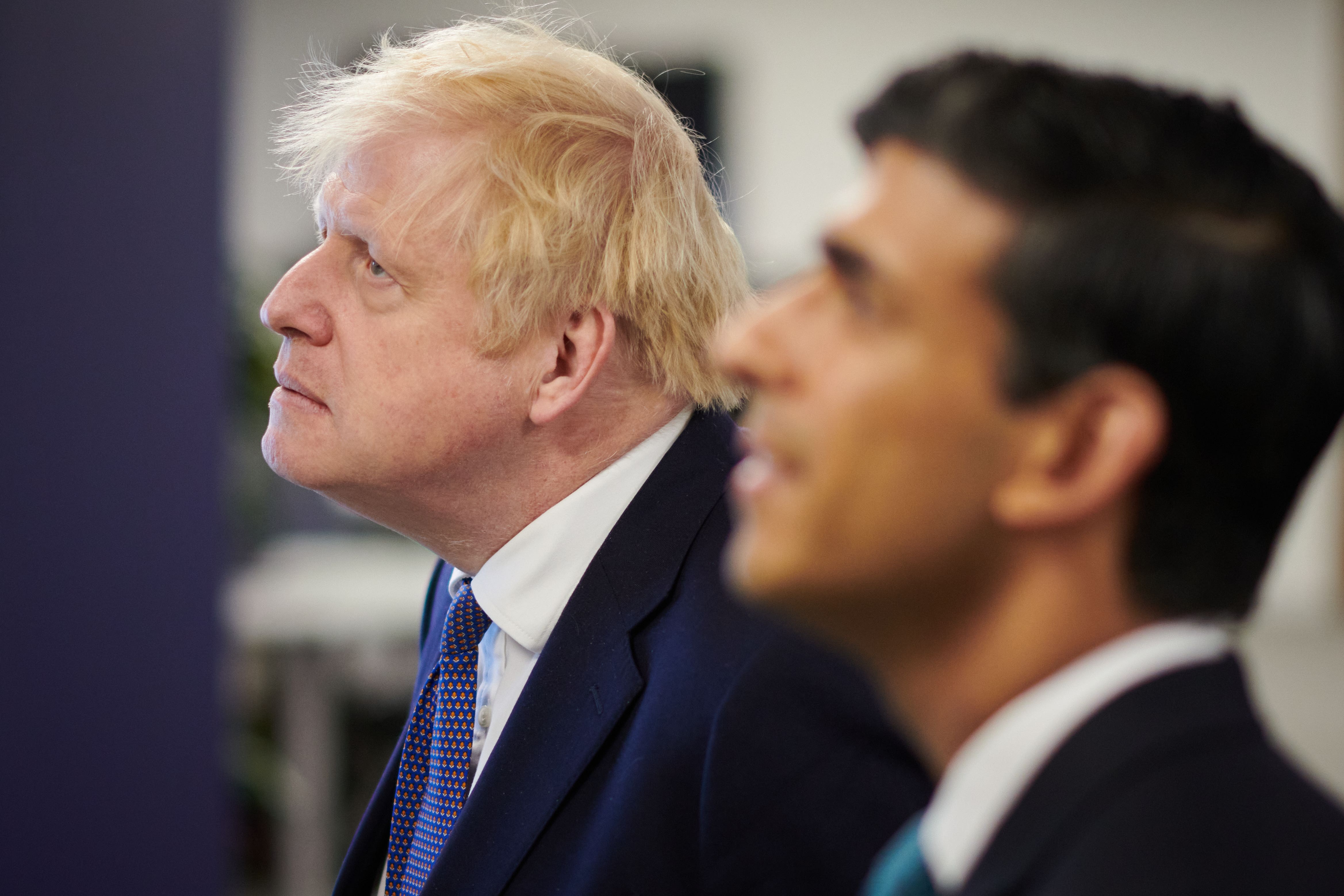
6 July 2022: Some three dozen junior ministers resign from the government, attacking Mr Johnson’s leadership. He briefly attempts to steady the ship by appointing Nadhim Zahawi as his new chancellor on a day of chaos and high drama in Westminster.
7 July 2022: Mr Johnson finally agrees to resign as Conservative Party leader and PM, firing the starting pistol on a summer-long Tory leadership race between Mr Sunak and foreign secretary Liz Truss.
6 September 2022: Mr Johnson leaves office to make way for the ill-fated Ms Truss, likening himself to the Roman statesman Cinncinatus in his farewell address outside No 10, seen by many as a veiled pledge to mount a comeback.
23 October 2022: Following Ms Truss’s announcement of her resignation as leader after just 46 days in response to the market turmoil caused by her uncosted “mini-Budget” and “growth, growth, growth” economic stimulus agenda, Mr Johnson races back to Britain from a Caribbean holiday to sound out support for a possible renewed bid for the Tory leadership. He ultimately concludes he does not have sufficient backing and announces that he will not stand after all. Mr Sunak gets the top job.
23 January 2023: Allegations surface that BBC chairman Richard Sharp, who had been appointed during Mr Johnson’s tenure as PM, had helped him arrange a guarantor on a loan of up to £800,000 in late 2020. Mr Sharp duly announces that he has requested a scrutiny panel to examine potential conflicts of interest while Mr Johnson insists the story is “a load of complete nonsense”.
22 March 2023: Mr Johnson finally appears before the Privileges Committee to deny he knowingly or recklessly misled Parliament over Partygate or had been tardy in amending the record in a tense and ill-tempered encounter. Prior to his appearance, Mr Johnson’s closest supporters had attempted to brand the panel as biased against him, despite its having a Conservative majority. On the same day, Mr Johnson’s attempt to lead a revolt against Mr Sunak’s Windsor Framework amendment to the Brexit agreement ends in humiliation.
9 June 2023: MrJohnson announces he is resigning as an MP after accusing a Commons investigation into whether he misled Parliament over partygate of attempting to “drive me out”. The former prime minister, in a statement to the media, compared the Privileges Committee probe to a “kangaroo court” as he announced his intention to step down as MP for Uxbridge and South Ruislip. He said, after receiving a letter from the committee, he believed it was “determined to use the proceedings against me to drive me out of Parliament”.
Additional reporting by agencies
Join our commenting forum
Join thought-provoking conversations, follow other Independent readers and see their replies
Comments
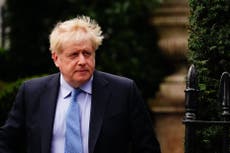

Bookmark popover
Removed from bookmarks